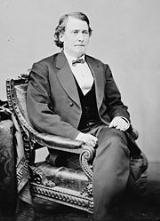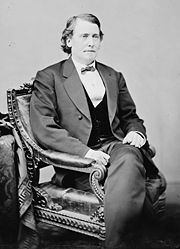
William Crawford Sherrod
Encyclopedia

United States
The United States of America is a federal constitutional republic comprising fifty states and a federal district...
politician and Confederate
Confederate States of America
The Confederate States of America was a government set up from 1861 to 1865 by 11 Southern slave states of the United States of America that had declared their secession from the U.S...
officer from Alabama
Alabama
Alabama is a state located in the southeastern region of the United States. It is bordered by Tennessee to the north, Georgia to the east, Florida and the Gulf of Mexico to the south, and Mississippi to the west. Alabama ranks 30th in total land area and ranks second in the size of its inland...
. He attended the University of North Carolina at Chapel Hill
University of North Carolina at Chapel Hill
The University of North Carolina at Chapel Hill is a public research university located in Chapel Hill, North Carolina, United States...
. Afterward, he was a planter
Plantation
A plantation is a long artificially established forest, farm or estate, where crops are grown for sale, often in distant markets rather than for local on-site consumption...
and served as a Delegate to the Democratic National Convention from Alabama in 1860. He was also a delegate to the Charleston convention of 1860
1860 Democratic National Convention
The 1860 Democratic National Convention was one of the crucial events in the lead-up to the American Civil War. Following a fragmented official Democratic National Convention that was adjourned in deadlock, two more presidential nominating conventions took place: a resumed official convention,...
.
Sherrod was a Unionist and failed to support the move for secession. Sherrod nevertheless served in the Confederate Army in the cavalry
Cavalry
Cavalry or horsemen were soldiers or warriors who fought mounted on horseback. Cavalry were historically the third oldest and the most mobile of the combat arms...
, as a Colonel under the command of Nathan Bedford Forrest
Nathan Bedford Forrest
Nathan Bedford Forrest was a lieutenant general in the Confederate Army during the American Civil War. He is remembered both as a self-educated, innovative cavalry leader during the war and as a leading southern advocate in the postwar years...
. After the conclusion of the American Civil War
American Civil War
The American Civil War was a civil war fought in the United States of America. In response to the election of Abraham Lincoln as President of the United States, 11 southern slave states declared their secession from the United States and formed the Confederate States of America ; the other 25...
, he served in the United States Congress in the House (1869–1871). After that, he served in the Alabama legislature.
William Crawford Sherrod wrote the following notes about his involvement in the Charleston Convention of 1860
1860 Democratic National Convention
The 1860 Democratic National Convention was one of the crucial events in the lead-up to the American Civil War. Following a fragmented official Democratic National Convention that was adjourned in deadlock, two more presidential nominating conventions took place: a resumed official convention,...
and his service during the Civil War:
"I was a member of the Charleston Democratic convention
1860 Democratic National Convention
The 1860 Democratic National Convention was one of the crucial events in the lead-up to the American Civil War. Following a fragmented official Democratic National Convention that was adjourned in deadlock, two more presidential nominating conventions took place: a resumed official convention,...
which convened in 1860; this was a very important period for the South, and the nation as well. I was a member of the Alabama legislature being 28 years of age, and at the time was made a delegate to the State Convention held at Montgomery and there made a delegate to the National Convention that was held at Charleston, SC.
"The Alabama convention directed its delegation to withdraw from the convention in the event of the convention refusing to guarantee the right of persons to carry their slaves into the Territories, and they demanded that the government should protect them in so doing. This was not in accordance with the views of Stephen Douglas
Stephen A. Douglas
Stephen Arnold Douglas was an American politician from the western state of Illinois, and was the Northern Democratic Party nominee for President in 1860. He lost to the Republican Party's candidate, Abraham Lincoln, whom he had defeated two years earlier in a Senate contest following a famed...
on the subject of slavery. Mr. Douglas
Stephen A. Douglas
Stephen Arnold Douglas was an American politician from the western state of Illinois, and was the Northern Democratic Party nominee for President in 1860. He lost to the Republican Party's candidate, Abraham Lincoln, whom he had defeated two years earlier in a Senate contest following a famed...
was the foremost candidate before the convention for the presidency -- he advocated the doctrine of "Squatter Sovereignty," with which I entirely agreed and endorsed Mr. Douglas' candidacy, but could do him but little good, as I believed that a state convention had a right to instruct its delegates, which instructions I obeyed to the letter.
"The delegates failing to get a plank endorsing the Alabama views, agreed to by the Committee on Platforms, withdrew,
I think it was on the 23rd day of April, from the convention. We all returned to Alabama. There was a division of the delegations as soon as the withdrawal was accomplished; about one-third of the delegates favored by Mr. Douglas, and the idea of Squatter-sovereignty, and the other two-thirds demanded unconditional protection; one set of delegates were called "Secessionists." The other set "Submissionists." The Secessionists called a convention to meet at Montgomery, Alabama, and the Submissionists called a convention to meet at Selma, Alabama.
"Both conventions sent delegates; the Secessionists to Richmond, VA, the Submissionists to Baltimore, Maryland, where the regular Democratic convention had adjourned at Charleston to meet at Baltimore.
"So far as I am advised, I am the only living delegate who was at the convention. I could not attend the Baltimore Convention with others who were appointed at Selma. the other delegates who were at Montgomery were appointed to Richmond. The Richmond Convention ultimately adjourned and met at the same time as the other convention at Baltimore, but there were two separate conventions. Douglas was nominated immediately by the regular convention, and Breckenridge
John C. Breckinridge
John Cabell Breckinridge was an American lawyer and politician. He served as a U.S. Representative and U.S. Senator from Kentucky and was the 14th Vice President of the United States , to date the youngest vice president in U.S...
by the seceding convention; then, the warmest political canvas imaginable was inaugurated in Alabama. I was still a member of the Alabama legislature and the governor issued a call for a special session of the legislature which met at the same time that the secession convention met at Montgomery. The Secession convention formed a government known as the "Southern Confederacy
Confederate States of America
The Confederate States of America was a government set up from 1861 to 1865 by 11 Southern slave states of the United States of America that had declared their secession from the U.S...
."
"I did not think it best for the South to secede and with two other members never signed the ordinance of secession. I believed that we would have a war that would be disastrous to the South and our best young men would all be sacrificed and the property of the South, which consisted mostly of negroes, would be lost. I had no idea at any time of separating myself from the South, preferring to be with them believing them to be wrong than to be with the Northern army knowing it to be right.
"At the beginning of the war I was engaged in special service the most of the time. I was in the last battle East of the Mississippi River which was fought after both Lee and Johnson surrendered. General Forrest, with whose command I was attached, fought General Wilson
James H. Wilson
James Harrison Wilson was a United States Army topographic engineer, a Union Army Major General in the American Civil War and later wars, a railroad executive, and author.-Early life and engineering:...
with about four thousand Confederates; the Federals having ten thousand as fine cavalry as ever followed any command in the line of battle. The last command that I ever received came from General Bedford Forrest in person at the battle of Selma
Battle of Selma
The Battle of Selma was a military engagement near the end of the American Civil War. It was fought in Selma, Alabama, on April 2, 1865. Union Army forces under Major General James H...
which was to have all the dry grass removed from the breast-works; that it would catch on fire whenever the fire became hot, and smoke us out."
Record of William Crawford Sherrod's military service in the Civil War:
Alabama Department of Archives and History, 624 Washington Avenue, Montgomery, AL 36130
Cavalry:
Sherrod, W. C. -- 5th Regt. Ala. Cav.
Act'g Ass't Commissary Subsistence
Organization of Brig. Gen. Roddey's
Phillip Roddey
Philip Dale Roddey was a brigadier general in the army of the Confederate States of America during the American Civil War.-Biography:...
Cav. Command November 20, 1864
[This information was filed with Chapter No. 2423 of the United Daughters of the Confederacy
United Daughters of the Confederacy
The United Daughters of the Confederacy is a women's heritage association dedicated to honoring the memory of those who served in the military and died in service to the Confederate States of America . UDC began as the National Association of the Daughters of the Confederacy, organized in 1894 by...
by Terry Downs Nelson on June 30, 1988 and accepted as proof of Confederate service]
In 1879 William Crawford Sherrod represented the Second Senatorial district in the upper house of the Alabama State Legislature and as a member of the finance Committee assisted in framing the revenue bill that piloted the state out of its indebtedness. He came to Florence in June 1883 for the purpose of schooling his children. In June 1886 in connection with W.B. Wood formulated the idea of the Florence Boom. He was one of the originators of the Florence Land & Mining Company, of the W.B. Wood Furnace Co., of which he is Vice President, also of the Florence Coal Coke & Iron Co., of the Florence Tuscaloosa & RR Co., of the Tennessee and Alabama RR Co., the Alabama, Florence & Cincinnati RR Co., the Florence & St. Louis RR Co., in all of which he is of the several board of directors.
To recur to his Congressional record, we find that the Southern Pacific Railroad
Southern Pacific Railroad
The Southern Pacific Transportation Company , earlier Southern Pacific Railroad and Southern Pacific Company, and usually simply called the Southern Pacific or Espee, was an American railroad....
bill was turned over to him after it had been abandoned by all others, and that it was placed in his hands at the special request of Gen. Freemont.
Col. Sherrod knew almost intimately every leading man in the 41st Congress and was upon terms of amity with them without regard to politics. To his credit, it may be said that he had at all times labored to promote and rebuild the country, and that he participated not in political discussions.
He was married at Nashville, Tennessee, October 21, 1856, to Miss Amanda Morgan, the accomplished daughter of Samuel Dold Morgan, whose body lies in the Tennessee Capitol building, by order of the Tennessee Legislature.

